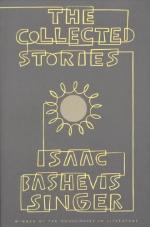|
This section contains 1,260 words (approx. 5 pages at 300 words per page) |

|
Although by the 1920s it had begun to flirt with socialism and even communism, Yiddish literature remained provincial and backward. Singer was at a loss to understand why Yiddish had avoided the great adventures inherent in Jewish history, the false messiahs, the expulsions, forcible conversion, Emancipation and Assimilation.
Despite the occasional use of historical settings, Singer is in no sense a historical novelist. What interests him is human nature, and human nature is everlastingly the same. Above all, what unites all his fiction is the perennial struggle between good and evil that rages ceaselessly in the human heart. From Satan in Goray (1955), the first novel he wrote,… to Shosha (1978 …), man serves as the battlefield for this struggle. The good intentions of men and women are disturbed by the devils and passions which upset their stable world. In The Manor (1967) Singer wrote that existence had always meant the same...
|
This section contains 1,260 words (approx. 5 pages at 300 words per page) |

|


